
Native Whey Protein Isolate
Native whey isolate, protein powder for muscle mass
Complete your selection
Native Whey Protein Isolate is a native whey isolate, the purest, highest-quality and most effective protein powder for building muscle.
Obtained from fresh milk, our whey is extremely rich in organic, high-quality protein, composed of proteinogenic amino acids (including 20% branched-chain amino acids, or BCAA). The microfiltration process means the proteins are not denatured and and contribute fully to building muscle mass. Native Whey Protein Isolate also contains health-beneficial minerals (calcium, magnesium...), a particularly low content of fat and lactose and no artificial flavouring.
Ideal for gaining muscle mass, this compound is part of our sport and exercise category.
What exactly is native whey isolate and what benefits does it offer?
As a reminder, whey is a group of proteins that occur naturally in milk. More precisely, whey is the liquid that remains after the milk has been curdled and strained.
Native whey isolate differs from ordinary whey in two key respects:
- firstly, native whey isolate is produced directly from cow’s milk, in contrast to conventional whey which is a by-product of the cheese-making industry (in which the amino acids are denatured by the curdling process). Native whey is thus nutritionally superior with a higher protein content ;
- secondly, as its name suggests, in whey isolate, the whey protein is ‘isolated’ from other non-protein components: fats and carbohydrates are eliminated as much as possible to ensure an even higher protein concentration. Whey isolate is therefore different from simple whey concentrate, which contains higher levels of fat and carbohydrate (including significant amounts of lactose which can cause digestive problems).
In terms of benefits, whey provides an easy and effective solution to meeting the high protein requirements of those looking to strengthen and develop their muscles, combined with regular weight-training. Protein helps to both maintain and build muscle mass, and maintain healthy bones. Sportspeople can also take protein powder to facilitate post-training recovery.
8 strengths of our native whey isolate
Our native whey isolate, the best form of protein powder available, stands out in 8 key aspects:
- its high protein content, including essential amino acids: our whey has an exceptional 92% protein content (27.5g per dose) made up of proteinogenic amino acids. Of the amino acids necessary for human health (the sub-units of proteins), 9 have to be obtained from the diet as the body is unable to produce them at a fast enough rate to meet our needs: they are leucine, isoleucine, lysine, methionine, phenylalanine, threonine, histidine, tryptophan and valine. All these essential amino acids are among those present in our native whey;
- its excellent proportion of BCAA: because of their high concentration in muscles, 3 amino acids are particularly important for sportspeople. Known as branched-chain amino acids, or BCAA, these are the first to be broken down during muscle exertion: leucine, which has the highest anabolic activity (1), isoleucine and valine. In Native Whey Protein Isolate, they constitute 20% of the product’s amino acids;
- its production from fresh, EU-origin milk: Native Whey Protein Isolate is obtained from fresh milk from grass-fed Irish cows, with guaranteed traceability;
- its cross-flow microfiltration: our native whey isolate is produced using a non-chemical, low-temperature cross-flow microfiltration process, which preserves the proteins’ native structure;
- its low fat and carbohydrate content (including lactose): this microfiltration process dramatically reduces the amount of fat (0.3g per dose) and carbohydrate (1.2g per dose), including lactose (0.8g per dose). This very low lactose content can improve whey digestibility in those who are lactose-sensitive. However, it cannot be completely eliminated, so it’s important to seek advice from a health professional before taking this whey product if you are severely lactose- intolerant;
- its high content of minerals including calcium: our native whey isolate contains a significant amount of minerals, particularly calcium (127mg a day - 16% of the recommended daily amount) which supports normal muscle function, playing a key role in muscle contraction and energy metabolism and helping to maintain healthy bones. Our whey also contains magnesium (24mg a day - 6% of the recommended daily amount) which supports normal energy metabolism and helps reduce fatigue, potassium (147mg a day - 7% of the recommended daily amount) which supports normal muscle function and helps maintain normal blood pressure, and phosphorus (72mg a day - 10% of the recommended daily amount) which supports normal energy metabolism and helps maintain healthy bones;
- its natural state and neutral taste: our whey is guaranteed free from artificial flavourings and aspartame ;
- its easy solubility: our whey mixes easily with your drink of choice due to the addition of sunflower lecithin, a natural, non-allergenic emulsifier.
What is in Native Whey Protein Isolate
Any questions?
Our team of nutrition experts and scientists has the answers.
We recommend taking one scoop a day of Native Whey Protein Isolate, diluted in your drink of choice (preferably water).
The hour after your workout is probably the best time to take it as this is when amino acids are absorbed best by the body. It’s referred to as the ‘anabolic window’ (2). But native whey isolate can also be taken before your training session (increasing the body’s amino acid reserves) and during training (to enhance performance).
Make sure you also consume other sources of protein on a daily basis and maintain a varied, balanced diet in general. But if you are allergic to dairy products, are lactose-intolerant, have kidney or liver problems or are taking medication which might interact with your protein powder, avoid whey, or consult a health professional before taking it.
In someone following a training programme, muscle mass develops from an alternating cycle of protein destruction and production.
During a weight training session, small tears occur in muscle which the body will repair during the post-exercise period: this is muscle anabolism. It requires all 20 proteinogenic amino acids, which enter cells via cell membrane transporters.
With Native Whey Protein Isolate, the assimilation of these amino acids is optimised, enabling them to reach the muscles easily and quickly activate muscle reconstruction (4-5).
If you’re a fan of bodybuilding and would like to use other products good for muscle development, here are 3 supplements which can maximise the effects of whey:
- well-known to sportspeople, creatine boosts physical performance in short, high-intensity exercise. It helps to replenish ATP (adenosine triphosphate), the main source of energy used by the muscles during intense exertion (try, for example, 3-Creatine) ;
- ursolic acid is also worth considering for its putative role in muscle hypertrophy and performance (try the supplement Ursolic Acid) ;
- and ornithine alpha-ketoglutarate is considered a good accompaniment to resistance training and muscle recovery (try Ornithine Alpha Ketoglutarate (OKG)).
As part of your training programme, we’d recommend adopting these 4 measures to boost the efficacy of whey in building muscle mass:
- follow a programme of resistance training: this consists of using weights, machines, resistance bands or your own bodyweight to create resistance which forces the muscles to contract. The goal is to to stimulate muscle growth and increase strength. Aim for gradual progress, increasing the loads and training volume to continuously support muscle hypertrophy (in other words, the increase in muscle tissue size) ;
- pay attention to your diet: spread your protein intake across the day (3), eating small, regular protein snacks, rather than 3 conventional meals. Protein should not, however, exceed 35% of your daily energy intake as this is counter-productive and could even be harmful to your health. Eat carbohydrates before exercising for optimal energy levels during training sessions and to promote protein synthesis (insulin secretion stimulates the entry of amino acid into cells). Make sure too that you avoid processed foods and excessive sugar consumption : they contribute to fat mass gain at the expense of muscle mass gain;
- get sufficient rest: allow your body enough time to recover by factoring in rest periods between your exercises and sets, as well as rest days in your training programme. Try to always get a good night’s sleep, 7-9 hours a night, as recovery is essential for muscle tissue repair and muscle growth;
- finally, learn to manage your stress: stress is bad for muscle hypertrophy as it increases levels of cortisol, a catabolic hormone which can inhibit protein synthesis and promote muscle breakdown. So allow yourself periods of active relaxation, such as regular meditation sessions.
The body’s protein levels undergo constant renewal: every day, around 300g of protein is broken down and needs to be replaced. The body produces around 220g of new protein from degraded protein and has to find the remaining 80g from the diet. However, these needs increase in the event of physical activity :
- muscle contractions require more energy (which they draw first from creatine, then from glucose in muscles, then carbohydrates, fatty tissue and protein) ;
- training results in inflammation which causes damage to muscle and tendon proteins;
- when muscle fibres break, the body may seek to build muscle mass
While 0.8g/kg/day of protein is recommended for sedentary individuals, regular exercisers and those who participate in endurance sports need 1.2-1.6 g/kg/day (20%-25% of total daily intake) and those engaged in sports involving strength or bodybuilding 1.8-2g/kg/day (6). When intake is inadequate, the body will use the amino acids of functional or structural proteins, resulting in atrophy of muscle mass.
This powdered supplement is offered in the purest form possible, unflavoured and unsweetened. When you choose this product, you are paying for and consuming active ingredients only, with no unnecessary additives (no sweeteners, artificial flavourings or added sugars). You can therefore consume it in the most natural way possible by simply mixing it with water, or you are free to personalise it : adding the sweetener of your choice, replacing the water with another drink (such as fruit juice), etc.
september 7 2025
Good product and easy to use. Better Whey product
june 26 2025
J'ai eu un maximum de gains grâce a cette whey. Merci, SuperSmart ! Bises.
april 29 2025
Alwaysgoodservice and good products
november 8 2025
Très digeste. Fidèle à la description quant à la composition. Intolérante au lactose, cette whey isolate me convient.
october 10 2025
Semble apporter des progrès
Need help?
You may also like

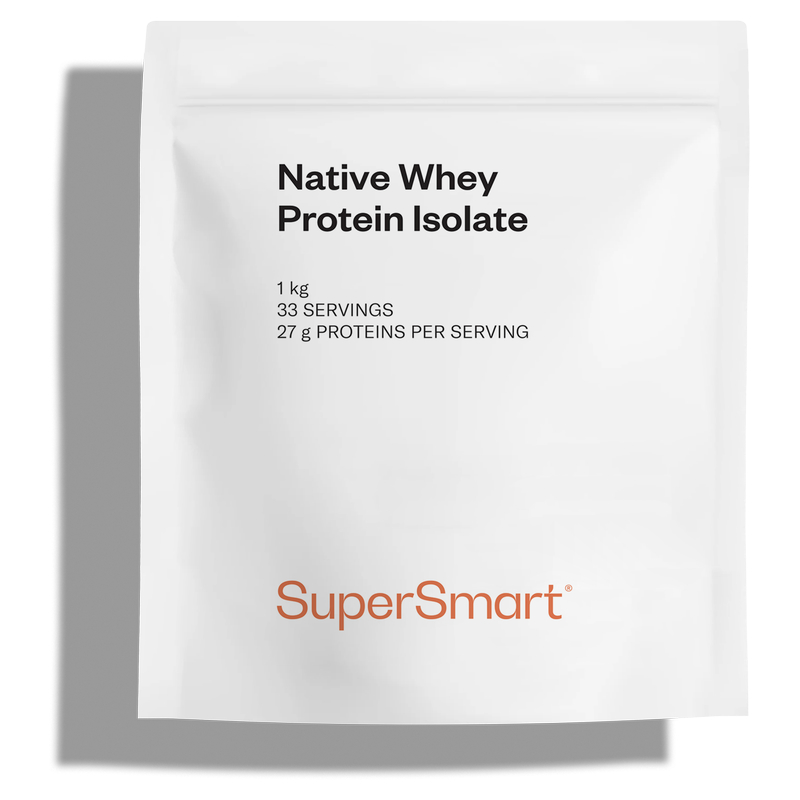
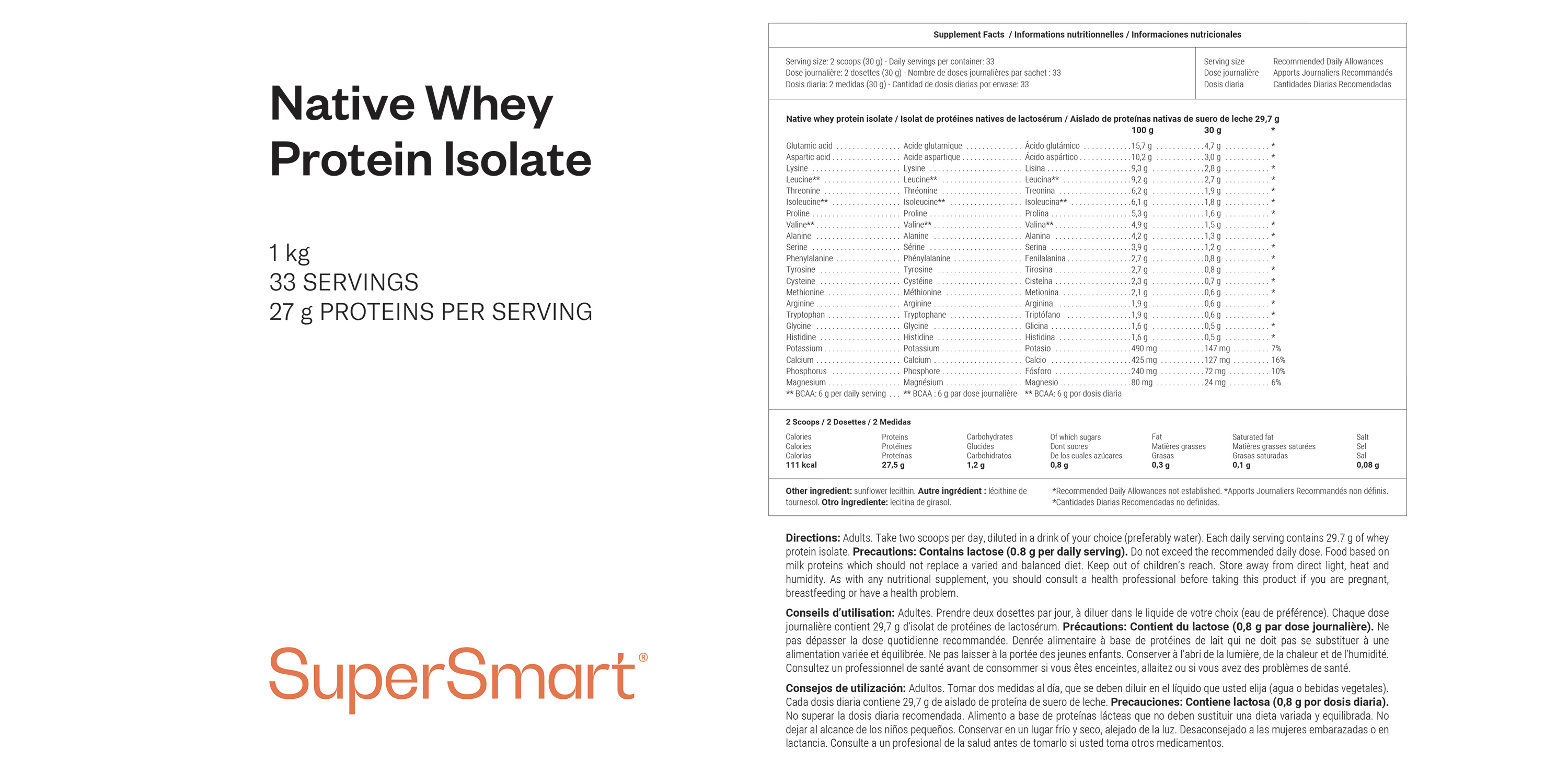
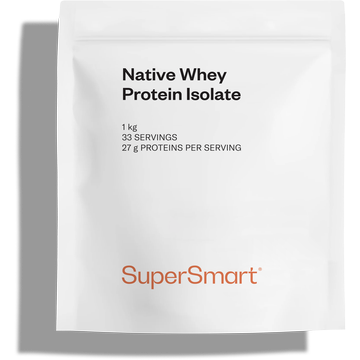
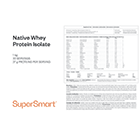


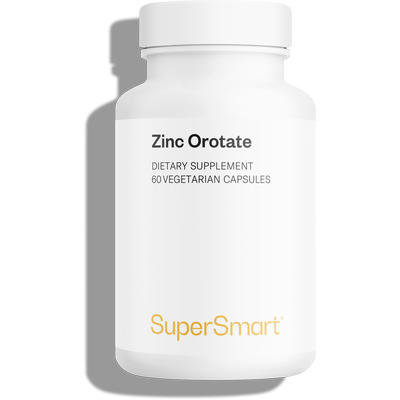
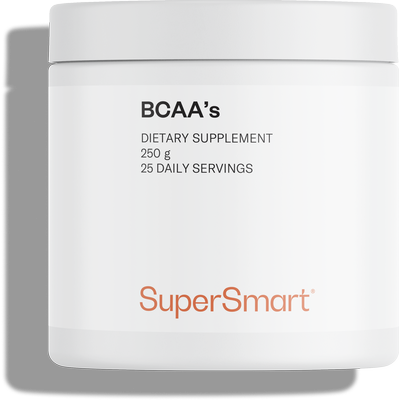
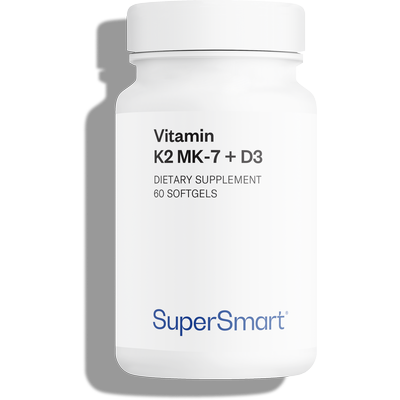
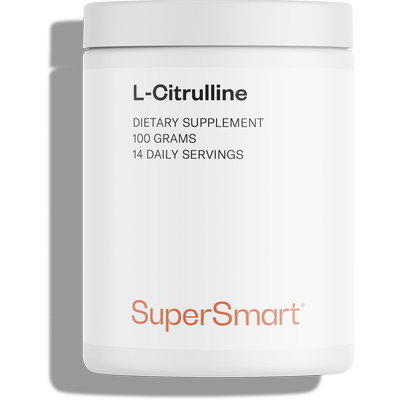
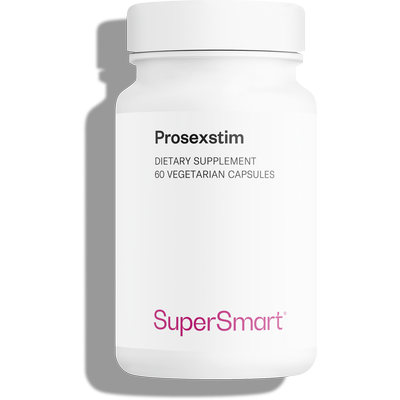
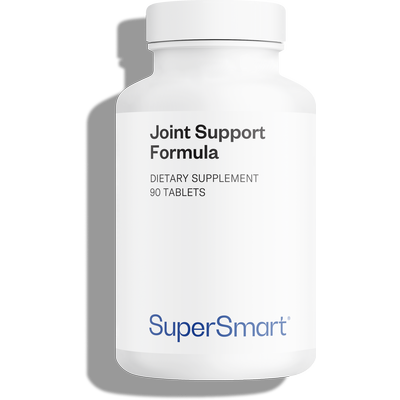
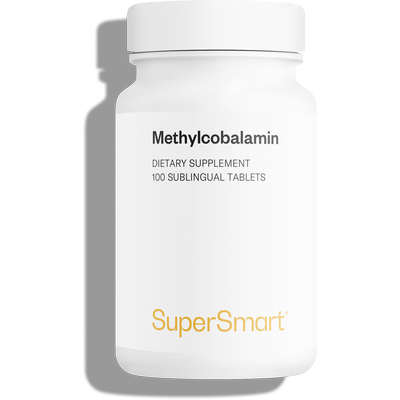

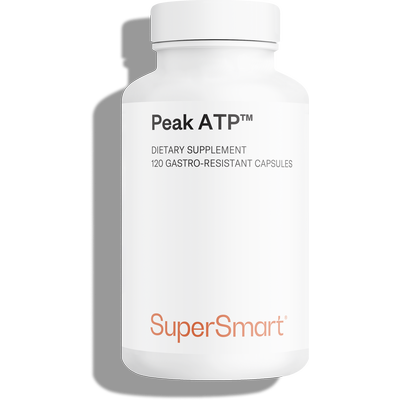
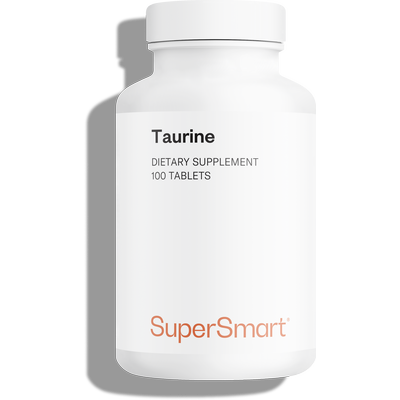
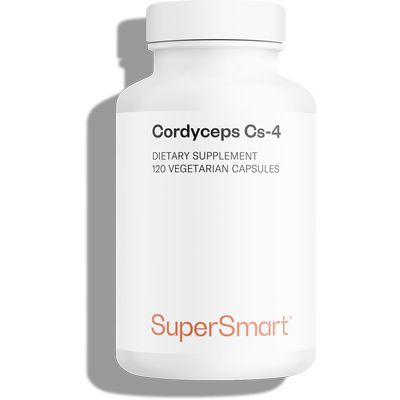
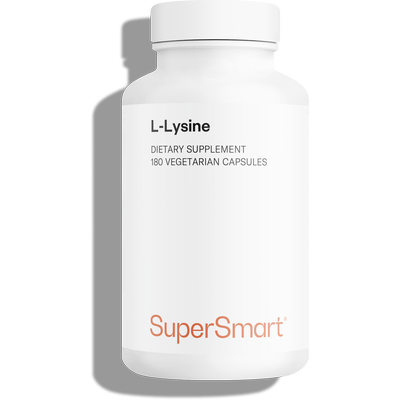
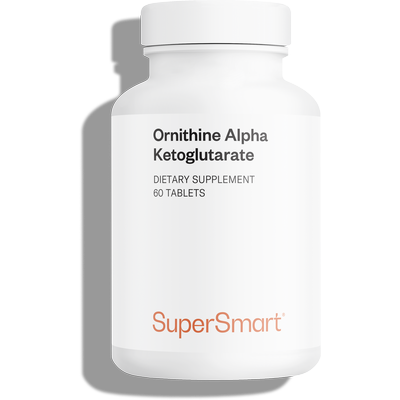

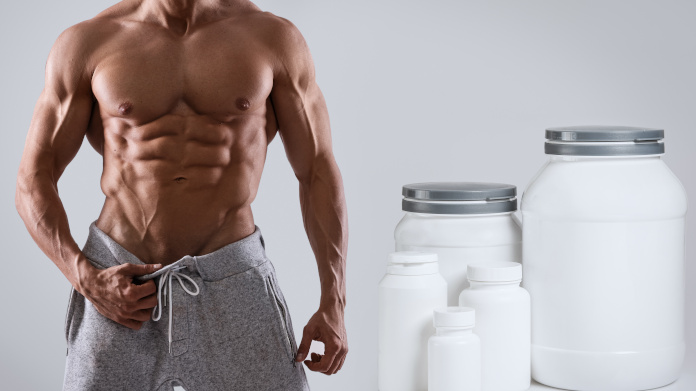
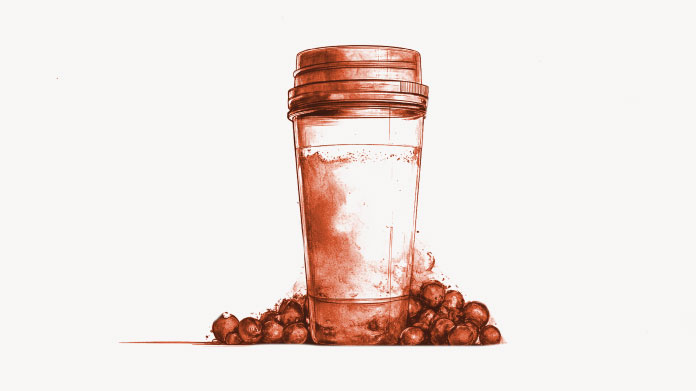
Bonjour,
Nous vous remercions pour votre retour concernant notre produit Undenatured Whey Protein Isolate 1kg. Nous tenons à vous informer que notre formulation a été revue et ne contient plus de Sucralose. Nous avons pris cette décision afin de répondre aux préoccupations de nos clients et d'améliorer la qualité de nos produits.
Nous sommes désolés pour les troubles intestinaux que vous avez subis et nous vous assurons que votre santé et votre satisfaction sont nos priorités. Nous espérons que vous serez satisfait de la nouvelle formulation.
Pourriez-vous s'il vous plaît envisager de modifier votre avis, afin qu'il reflète les améliorations apportées à notre produit? Votre retour est très important pour nous et pour nos futurs clients.
Merci de votre compréhension et de votre soutien. Si vous avez d'autres questions ou des préoccupations, n'hésitez pas à nous contacter.
Cordialement,
L'équipe Supersmart